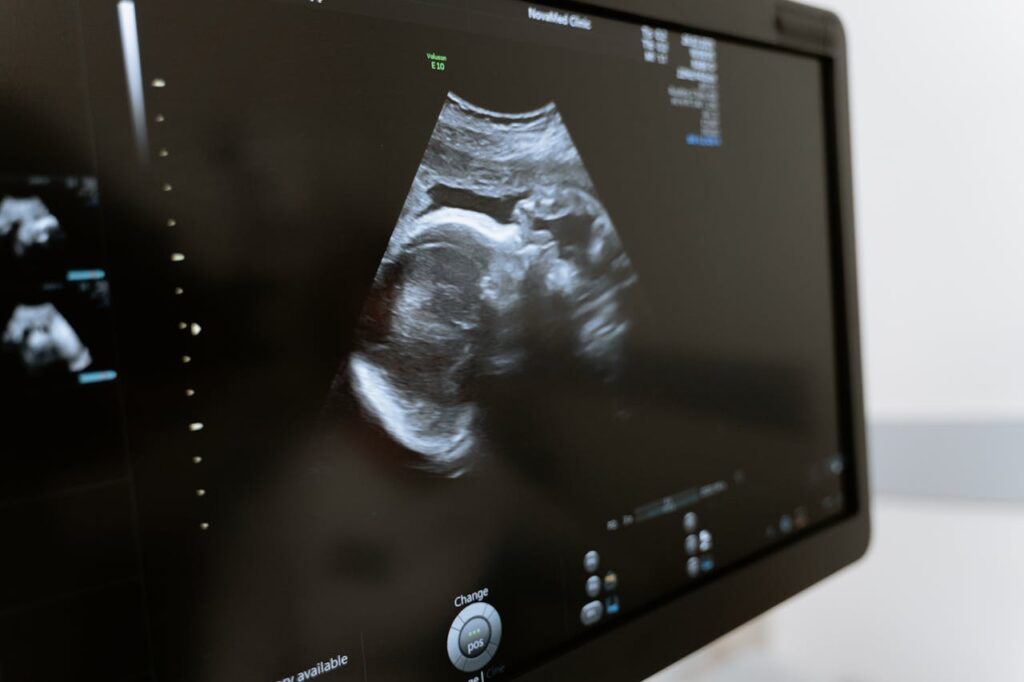Since finding out you are pregnant, you’ve been making parenting decisions for you and your baby. You’ve started taking prenatal vitamins and cut out unhealthy habits. You’ve decided who you want to deliver your baby, and made that first appointment. Things certainly are moving along!
Being newly pregnant and not knowing what to expect can be intimidating. When you scheduled that first appointment, staff may or may not have told you what to expect. This is a novel experience so you may not have even known what to ask. Having information and knowing what to expect is empowering! That’s why this first series of posts is all about giving you information. Information about what to expect at that initial visit. And now information about what the initial ultrasound will be like. Keep reading for answers to the top 5 questions about first trimester ultrasounds.
1. Why do they do an ultrasound in the first trimester?
Many women are not sure of their exact menstrual cycle dates. This can lead to inaccurate estimations of gestational age. Ultrasounds are helpful because they can help your pregnancy provider accurately date your pregnancy. And ultrasounds in the first trimester are more accurate compared to ultrasounds in later trimesters.
Another reason ultrasounds are performed is to make sure that fertilization and implantation occurred normally. If there is an abnormality in conception with the combining of egg and sperm, no embryo is formed at all (this is called a molar pregnancy-more about that in a later post). If there is an abnormality with implantation of the embryo outside the uterus, that would be an ectopic pregnancy which can be life threatening.
2. Should I use the restroom before or after the ultrasound?
Ultrasounds work by transmitting sound waves through the body which bounce back to the probe and form a picture on the screen. Fluid appears as solid black and tissue as varying shades of gray.
The bladder is normally squished up against the uterus, and gray tissue against gray tissue can be difficult to differentiate. If they are going to use a probe on your abdomen, it is usually recommended to show up with a full bladder. If the bladder is full of urine, it should appear as a solid black bubble and provide a more distinct contrast against the uterus and ovaries.
But, if they will be using a transvaginal probe, you should empty your bladder before starting the ultrasound. Otherwise the probe can put pressure on your full bladder!
3. Will they use a transvaginal or abdominal probe?
It depends on your provider.
Transabdominal ultrasounds with a full bladder used to be standard. Over the years, transvaginal ultrasounds (TVUS) have replaced abdominal imaging due to better image quality at earlier gestations. This is because the probe can make direct contact with the opening of the uterus. 1 TVUS also do not require patients to have an uncomfortably full bladder to increase image quality.
TVUS are usually necessary to evaluate pregnancies less than 8 weeks gestation. But if you are farther along, a transabdominal ultrasound should be sufficient. If you are not comfortable with having a TVUS, don’t be afraid to ask your provider if you are a good candidate for the less invasive transabdominal ultrasound. Keep in mind that certain factors, like a large body habitus, can prevent ultrasound waves from reaching the uterus which may make the TVUS a better test.
4. What will they see on the ultrasound?
It depends how far along you are.
Before the 6 week mark, baby has already started developing his primitive brain and spinal cord. But, he may still be too small to see clearly on ultrasound. Instead, your doctor may be looking for structures like the gestational sac and yolk sac to be in their proper place.
After the 6 week mark, baby should be developed enough to detect the early heartbeat! Baby should also be large enough to measure from his head to his rear (crown-rump length) which should correlate with an estimated gestational age.2
5. Are ultrasounds dangerous?
There are definitely many things to avoid while you’re pregnant to protect your baby. Every (and I do mean every) test or procedure in medicine has risks and benefits. It is up to you to discuss the risks and benefits with your provider so you can make an informed choice.
The general consensus in medicine is: there is no evidence that fetal ultrasounds cause any adverse effects to the unborn baby. 3 Some studies have been done to evaluate for any association between ultrasound exposure and autism, which did not find any link. 4 However, there is theoretical concern that the energy from the ultrasound machine may expose fetuses to a high thermal index (TI). The hypothesis is that an elevated TI during the study may cause increased temperature in the fetus and lead to tissue damage. However, studies so far have found a negligible increase in TI and there is no evidence of any clinically significant impact on the baby. 5
At this time, the benefits of first trimester ultrasound in establishing accurate dates and ensuring normal development are usually considered worth the theoretical risks. But, the limited data on this subject leads the Association for Medical Ultrasound to recommend avoiding excessive, medically unnecessary ultrasound exposure. 3 Talk with your doctor about your specific situation if you have additional questions.
The first ultrasound is such a surreal and joyful moment! You’ve already confirmed you’re pregnant with a pregnancy test. You’ve missed your last menstrual cycle. It’s likely you are even experiencing some early pregnancy symptoms. But seeing your baby’s heartbeat on that little screen somehow makes it feel more real for both moms and dads. This is your baby’s first picture, so ask for copies! In 9 months, you’ll be holding that sweet little baby in your arms.

